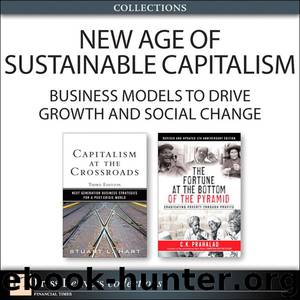New Age of Sustainable Capitalism: Business Models to Drive Growth and Social Change (Collection), ePub, The by Hart Stuart L. & Prahalad C.K

Author:Hart, Stuart L. & Prahalad, C.K. [Hart, Stuart L.]
Language: eng
Format: epub
Publisher: Pearson Education
Published: 2013-05-01T22:00:00+00:00
Business and the New Social Compact
Business leaders who have engaged themselves actively with the Bottom of the Pyramid have started to reexamine the role of business in society. Many CEOs have come to look at business with a new lens—the Bottom of the Pyramid lens. Mr. Patrick Cescau, the retired CEO of Unilever, is one of them. His views reflect the growing appreciation of the role of the private sector in protecting the planet and at the same time serving the poor.
“For one, there is a growing recognition that the social and environmental challenges facing us in the twenty-first century are so complex and so multi-dimensional that they cannot be solved by governments alone. Industry has to be part of the solution. But perhaps the biggest catalyst for change has been the increasing awareness within business itself that many of the big social and environmental challenges of our age, once seen as obstacles to progress, have become opportunities for innovation and business development. We have come to a point now where the agenda of sustainability and corporate responsibility is not only central to business strategy but has become a critical driver of business growth.”
Recently, Bill Gates surprised his colleagues by suggesting that we need to reexamine the role of capitalism. His solution was to move to “creative capitalism.”13 He defined it as
There are two great forces of human nature: self-interest, and caring for others. Capitalism harnesses self-interest in a helpful and sustainable way, but only on behalf of those who can pay. Government aid and philanthropy channel our caring for those who can’t pay. But to provide rapid improvement for the poor we need a system that draws in innovators and businesses in a far better way than we do today.
Such a system would have a twin mission: making profits and also improving lives of those who don’t fully benefit from today’s market forces. For sustainability we need to use profit incentives wherever we can. At the same time, profits are not always possible when business tries to serve the very poor. In such cases there needs to be another incentive, and that incentive is recognition. Recognition enhances a company’s reputation and appeals to customers; above all, it attracts good people to an organization. As such, recognition triggers a market-based reward for good behavior. In markets where profits are not possible, recognition is a proxy; where profits are possible, recognition is an added incentive.
The challenge here is to design a system where market incentives, including profits and recognition, drive those principles to do more for the poor.
I like to call this idea creative capitalism, an approach where governments, businesses, and nonprofits work together to stretch the reach of market forces so that more people can make a profit, or gain recognition, doing work that eases the world’s inequities.
Then there are those who promote the idea of Social Capital. This movement is led by Prof. Mohummed Yunnus of Grameen Bank fame. There is a lot of ferment and discussion in understanding the role of markets and the role of capitalism.
Download
This site does not store any files on its server. We only index and link to content provided by other sites. Please contact the content providers to delete copyright contents if any and email us, we'll remove relevant links or contents immediately.
The Brazilian Economy since the Great Financial Crisis of 20072008 by Philip Arestis Carolina Troncoso Baltar & Daniela Magalhães Prates(133834)
International Integration of the Brazilian Economy by Elias C. Grivoyannis(110635)
The Art of Coaching by Elena Aguilar(53199)
Flexible Working by Dale Gemma;(23285)
How to Stop Living Paycheck to Paycheck by Avery Breyer(19720)
The Acquirer's Multiple: How the Billionaire Contrarians of Deep Value Beat the Market by Tobias Carlisle(12314)
Thinking, Fast and Slow by Kahneman Daniel(12267)
The Radium Girls by Kate Moore(12018)
The Art of Thinking Clearly by Rolf Dobelli(10455)
Hit Refresh by Satya Nadella(9126)
The Compound Effect by Darren Hardy(8949)
Tools of Titans by Timothy Ferriss(8369)
Atomic Habits: Tiny Changes, Remarkable Results by James Clear(8327)
Turbulence by E. J. Noyes(8040)
A Court of Wings and Ruin by Sarah J. Maas(7822)
Change Your Questions, Change Your Life by Marilee Adams(7761)
Nudge - Improving Decisions about Health, Wealth, and Happiness by Thaler Sunstein(7694)
How to Be a Bawse: A Guide to Conquering Life by Lilly Singh(7472)
Win Bigly by Scott Adams(7184)
